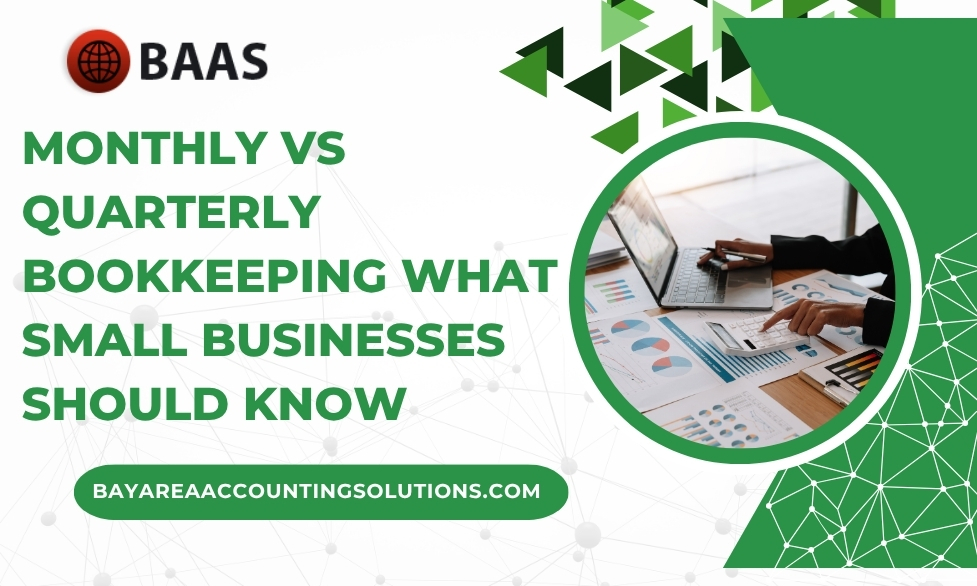Monthly vs. Quarterly Bookkeeping: What Small Businesses Should Know
For small business owners in Fremont, San Jose, and the Bay Area, keeping accurate financial records is critical for growth, compliance, and decision-making. But many entrepreneurs struggle to decide how often they should maintain their bookkeeping.
Understanding the difference between monthly and quarterly bookkeeping helps business owners balance accuracy, cost, and efficiency. This guide explains the pros, cons, and considerations for choosing the right bookkeeping schedule for your small business.
Why Bookkeeping Frequency Matters
Bookkeeping is more than just tracking income and expenses — it impacts:
- Cash flow management
- Tax compliance
- Financial decision-making
- Investor or lender reporting
Choosing the right frequency ensures your books are accurate and actionable, without consuming unnecessary time or resources.
Monthly Bookkeeping
What It Is:
Recording and reconciling all financial transactions, generating reports, and reviewing accounts every month.
Benefits:
- Up-to-date financial data: Know exactly where your business stands each month.
- Early error detection: Identify mistakes or discrepancies before they grow.
- Better cash flow management: Plan for payroll, expenses, and taxes effectively.
- Improved decision-making: Access timely insights to guide growth strategies.
Considerations:
- Requires more time and resources than quarterly bookkeeping
- May be unnecessary for very small businesses with limited transactions
Pro Tip: Even small businesses benefit from monthly reconciliation to avoid surprises during tax season.
Quarterly Bookkeeping
What It Is:
Recording transactions and reconciling accounts every three months, typically aligned with tax quarters.
Benefits:
- Lower cost: Less frequent bookkeeping reduces expenses.
- Sufficient for simple businesses: Works for businesses with few transactions or limited cash flow complexity.
- Tax preparation alignment: Aligns with quarterly estimated tax filings.
Considerations:
- Delayed insight into cash flow and financial health
- Errors or missed deductions may go unnoticed for longer periods
- Less control over budget and spending decisions
Pro Tip: Quarterly bookkeeping is best for very small businesses with low transaction volume or startups with minimal cash flow complexity.
How to Decide Between Monthly and Quarterly Bookkeeping
Factors to consider:
- Business size and transaction volume: High-volume businesses benefit from monthly bookkeeping.
- Cash flow complexity: If cash flow is tight, monthly oversight helps avoid shortages.
- Tax obligations: Businesses with payroll, sales tax, or multiple deductions may need monthly tracking.
- Growth plans: Companies planning rapid growth should track finances monthly to make informed decisions.
- Budget for bookkeeping services: Weigh the cost against the value of timely insights.
Pro Tip: Many small businesses start with monthly bookkeeping for the first year, then reassess as operations stabilize.
Why Professional Bookkeeping Helps
Whether monthly or quarterly, outsourcing bookkeeping to a professional firm provides:
- Accurate recordkeeping and reconciliation
- Timely reports for decision-making
- Tax preparation support and compliance
- Cash flow forecasting and budgeting
Pro Tip: A Bay Area-based accounting service can tailor the frequency to your business needs, ensuring cost efficiency without sacrificing financial insight.
Why Small Businesses Choose Bay Area Accounting Solutions (BAAS)
At Bay Area Accounting Solutions, we help small businesses across Fremont, Oakland, San Jose, and the surrounding areas:
- Set up monthly or quarterly bookkeeping systems
- Reconcile accounts and track expenses accurately
- Generate real-time financial reports
- Prepare for taxes and investor reporting
Partnering with BAAS ensures your business maintains clean books, stays compliant, and has the insights needed for growth — regardless of the bookkeeping frequency you choose.
Conclusion
Deciding between monthly and quarterly bookkeeping depends on your business size, transaction volume, cash flow, and growth plans. Monthly bookkeeping offers up-to-date insights and tighter control, while quarterly bookkeeping may be sufficient for smaller or simpler operations.
By partnering with a professional accounting service, small businesses can ensure accurate records, avoid tax issues, and make informed financial decisions.
Ready to simplify your bookkeeping? Contact Bay Area Accounting Solutions today to choose the right bookkeeping frequency for your small business and maintain financial clarity.
FAQ — Monthly vs. Quarterly Bookkeeping
Q1: Can a small business switch between monthly and quarterly bookkeeping?
Yes. Many businesses start quarterly and switch to monthly as they grow.
Q2: Which option is cheaper?
Quarterly bookkeeping typically costs less due to fewer hours required, but monthly bookkeeping can prevent costly errors.
Q3: How does bookkeeping frequency affect taxes?
Monthly bookkeeping provides timely tracking of deductions, payroll, and sales tax, reducing the risk of penalties.
Q4: Is professional bookkeeping necessary for quarterly bookkeeping?
Yes. Even quarterly records need accuracy and proper reconciliation to avoid issues with IRS or California tax filings.
Q5: Can bookkeeping software replace professional services?
Software helps, but professional oversight ensures compliance, accuracy, and actionable financial insights.





